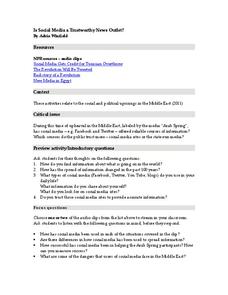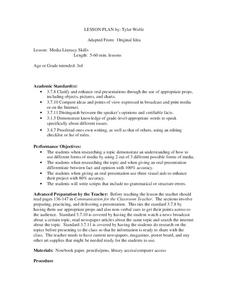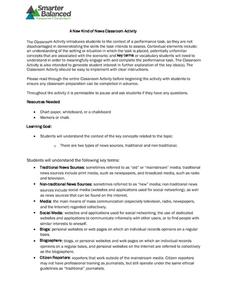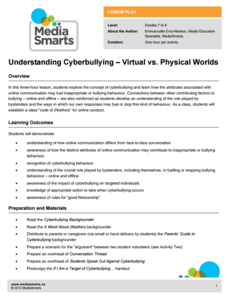Facing History and Ourselves
Social Media and Ferguson
How can social media help or hinder civil dialogue? How can information shared on social media be verified? As the investigation of media reports of the events surrounding the shooting of Michael Brown continues, class members read news...
American Press Institute
Media Literacy: Where News Comes From
What actually happens at a press conference? Make sense of the mayhem with a mock press conference activity designed to promote media literacy. Individuals participate as either members of the press or the governor's office to examine...
Curated OER
Bias and Crime in Media
Critical thinking and social justice are central themes for this resource on bias and crime in media. The class views and discusses an incisive PSA that highlights assumptions based on race. Small groups read newspaper opinion pieces...
Southern Poverty Law Center
Analyzing Gender Stereotypes in Media
Why might toy advertisers use gender stereotypes to sell their products? Young people think critically about media messages and its role in gender stereotyping with a thought-provoking lesson.
Facebook
Social Media and Sharing
Whether it's cute cat videos or pictures from an epic vacation, scholars love to check out what's happening on social media! But, how much sharing is too much? A instructional activity from a vast digital citizenship series poses some...
Curated OER
Is Social Media a Trustworthy News Outlet?
Examine the role of social media in social and political uprisings. Pupils listen to NPR audio clips about social media and the Arab Spring and read an article that proposes the idea that revolution will not happen through social media....
Curated OER
Media Literacy Skills
You're on camera! Third graders find a news story and research it to get more information. Everyone uses their found information to write a script and create their own news broadcast!
Southern Poverty Law Center
Analyzing How Words Communicate Bias
Words are powerful ... can your class choose them wisely? Scholars evaluate news articles to discover the concepts of tone, charge, and bias during a media literacy lesson. The resource focuses on recognizing implicit information and...
Facebook
Online Presence
What happens when an online post gets the wrong kind of attention? Learners evaluate the good, the bad, and the occasionally ugly side of social media posting with a instructional activity from a vast digital citizenship series. After...
PBS
Interviewing: The Art of Asking Questions
Interviewing skills are important, even outside of a news reporter's desk or employer's office. Take your class through the process of interviewing people they don't know with a set of case studies featuring journalists and various...
Newseum
Civil War: Encoding the News
Young journalists learn to appreciate the advantages of how modern media technology enables rapid news delivery as they compare today's media revolution to how the telegraph and Morse Code revolutionized news coverage during the Civil...
Nemours KidsHealth
Media Literacy and Health: Grades 6-8
Internet suffers could drown in the volume of information available on line. Here's an activity that can be a lifeline and buoy confidence in middle schoolers' ability to find reliable information and credible sources. After reading...
Media Education Lab
Understanding Viral Messages
Imagine advertising for a product but not being paid to do so. Welcome to the world of Viral Messaging. Class members first view a T-Mobile flash mob video that went viral and has been seen by over 14 million viewers. After analyzing the...
Common Sense Media
Oversharing: Think Before You Post
Could your learners use a little more discretion when they post online? Take a look at these ten rules of posting etiquette, which prompts them to be smart about what photos and information they share on the Internet.
Common Sense Media
Digital Compass
Time to make some real world decisions in an interactive digital citizenship game. Choose a story and help the characters make the right decisions regarding Internet safety, cyberbullying, copyright, media literacy, appropriate online...
Anti-Defamation League
Building a Foundation for Safe and Kind Online Communication
Put a spotlight on internet safety with a lesson designed to boost positive online communication. Scholars listen to the story, Yettele's Feathers by Joan Rothenberg, and answer questions. An emoji-themed handout challenges pupils to...
Southern Poverty Law Center
Evaluating Online Sources
All sources are pretty much the same, right? If this is how your class views the sources they use for writing or research projects, present them with a media literacy lesson on smart source evaluation. Groups examine several articles,...
Smarter Balanced
A New Kind of News
Newspapers and broadcast news. Social media, blogs, and blogospheres. Class members generate a list of news sources they use to get information about events. The big idea here is to introduce the necessary vocabulary and to establish a...
Teaching Tolerance
Tweeting for Change
Do some good with social media. Secondary scholars participate in a live Twitter chat focusing on social justice issues. The thought-provoking activity allows academics to set up a live chat, create responses, and express their personal...
Media Smarts
Understanding Cyberbullying — Virtual vs. Physical Worlds
Spend a few days discussing cyberbullying with an engaging lesson plan. Opening discussion questions get the conversation started while quotes and articles continue thoughtful dialogue. Small group activities and role-play scenarios...
Curated OER
Edward R. Murrow: This Reporter
What would Edward R. Murrow think of today’s news broadcasts? Learners examine the work of the first public television newscaster and his commitment to researched, accurate reporting. The eight-day study concludes with investigators...
Teaching Tolerance
How Online Communication Affects Privacy and Security
Digital footprints leave a lot of clues behind! Pupils discuss the positives and negatives of having a digital footprint and what it means. Then, using a handout, scholars learn ways to protect their online privacy.
Facebook
Privacy and You
The stuff I share goes where? Social media scholars discover how sites collect and use metadata during a lesson about privacy and reputation. The activity demonstrates smart privacy settings and promotes good digital citizenship.
Curated OER
Sex on TV: Teens and Parents Talk
Students observe human psychology by completing a media analysis worksheet. In this parent and teen communication lesson, students identify the main programs on television today and how sex is used to sell the program as well as...

























